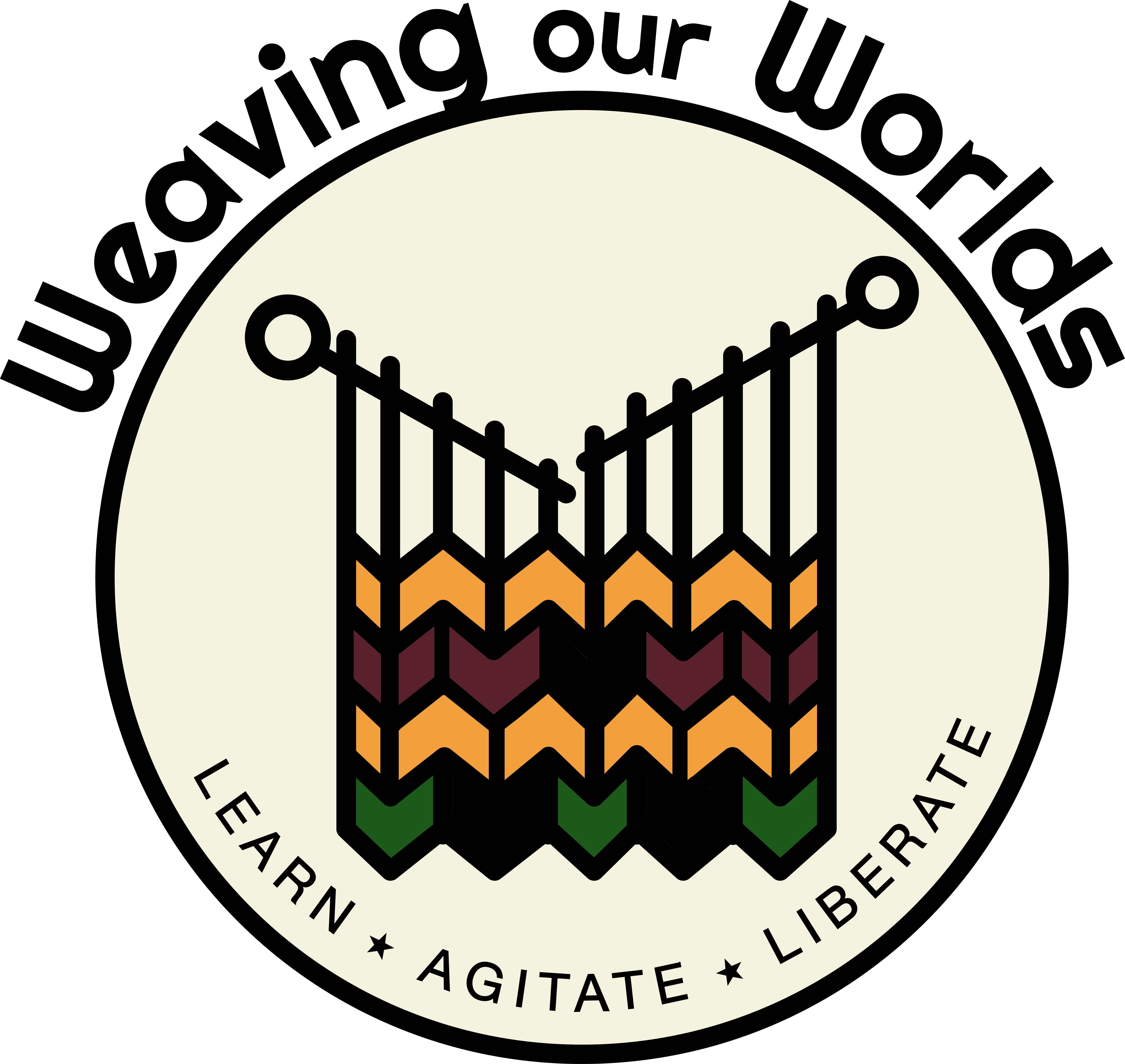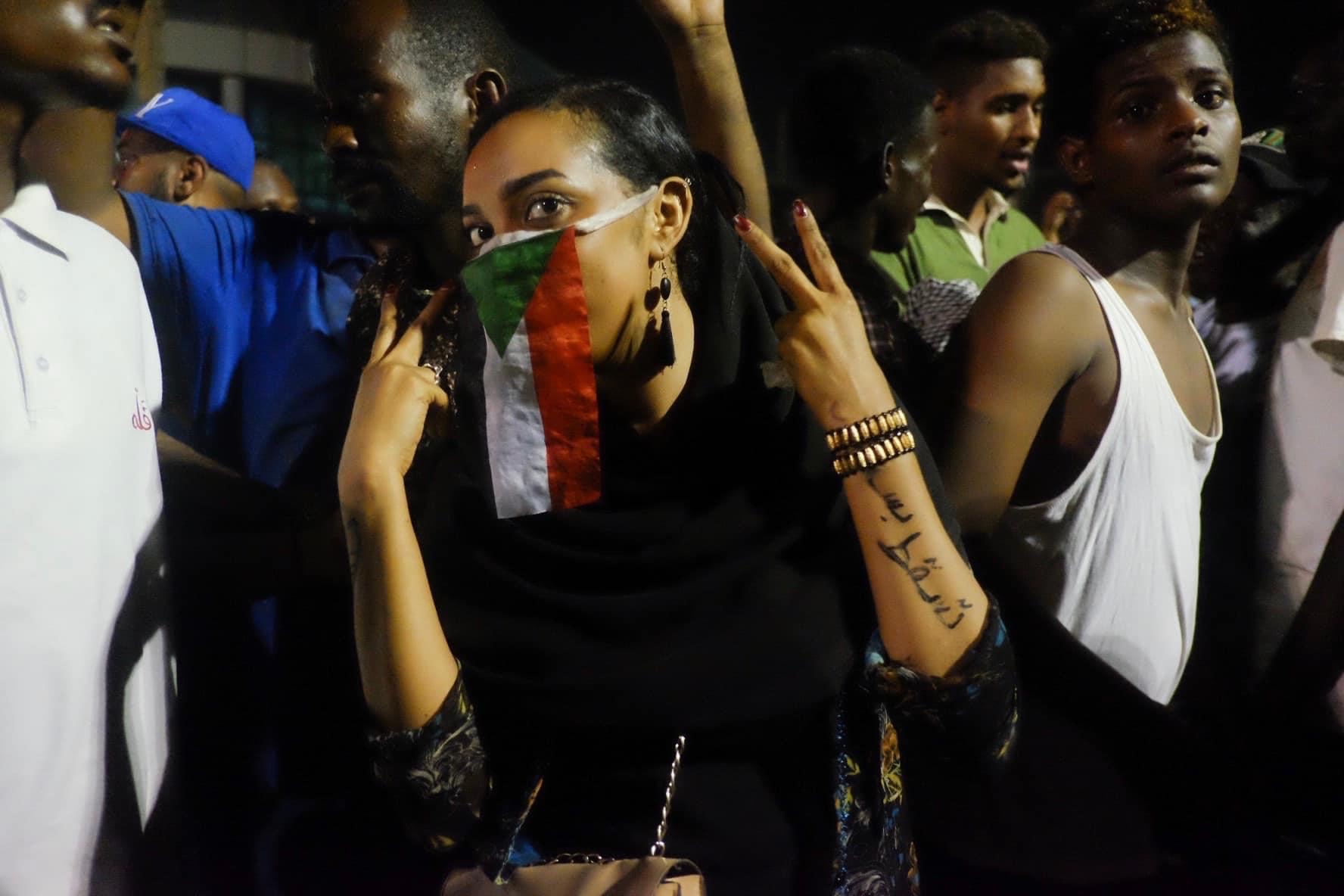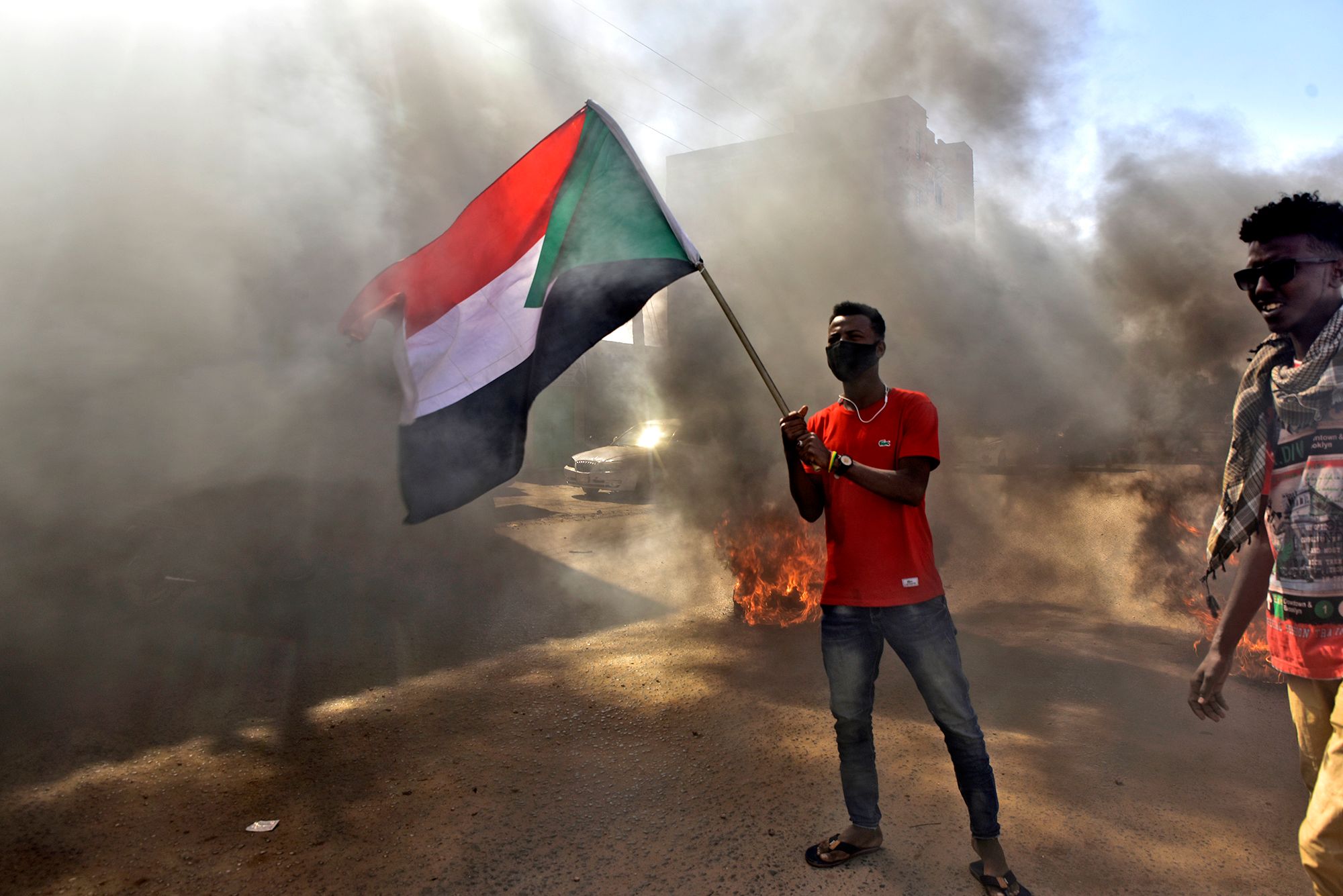Beyond Slogans: Free Sudan
The headlines are horrifying: Aid Blocked. El Fasher under siege. Ethnic cleansing. Famine. Millions displaced. Beyond slogans like Eyes on Sudan or Free Sudan, how can we act in solidarity with people in El-Fasher, in Darfur, and across Sudan?
Against imperialist, anti-African, and anti-Black narratives of Sudan’s “civil war” and “failed state,” Weaving Our Worlds offers this resource on Sudan, the long arc of imperialism and colonialism, and how we can act in engaged solidarity with civilian efforts to continue the revolution.
Brief Context
What is happening in Sudan is not a civil war or proxy war, it is a counter-revolutionary war led by global elites to extract land and resources, maintain an export-oriented extractive economy, and establish an anti-people regime that blocks the path of the December Revolution for freedom, peace, and justice.
The people of Sudan rose up against against President Omar al-Bashir’s dictatorship during the December Revolution of 2018. Since then, a counter-revolutionary war is being waged, currently between the Sudanese Armed Forces (SAF) and the Rapid Support Forces (RSF).
Sudan is seen as “geographically strategic” by global powers – located between the Sahel region and Red Sea region, and between the Mediterranean and southern Africa. Despite a partial arms embargo, the global arms trade to both the RSF and SAF includes weapons produced in the UAE, UK, Serbia, Turkey, Russia, and China, while Colombian mercenaries are fighting for the RSF and training child soldiers. This week, the US welcomed RSF senior commander Al-Junaid Dagalo to Washington. This global impunity has created the world’s largest displacement crisis, the world’s largest humanitarian crisis, and a genocide in Darfur.
Rapid Support Forces (RSF)
RSF are a genocidal paramilitary headed by Mohamed Hamdan Dagalo (Hemedti). While mainstream reports portray the RSF and SAF in conflict with each other since 2023, they emerge from the same political elite system. RSF was officially in the military government structure: Hemedti had been SAF’s al-Burhan’s deputy in the military junta in 2019 and during the 2021 counter-revolutionary coup.
Even before that, Al-Burhan and Hemedti were both perpetrators of the 2003 genocide in Darfur and part of the al-Bashir regime. During the 2003 genocide and ethnic cleansing in Darfur against Fur, Masalit, and Zaghawa people, Janjaweed militias received arms and logistical support from the Arab-dominated regime in Khartoum. Founded in 2013 from the remnants of these Janjaweed militias, RSF was backed by President al-Bashir. RSF were initially EU-backed border guards to stop migrants from crossing the border between Darfur and Libya and across the Mediterranean into Europe. RSF and other forces were later used to violently crackdown on the Sudanese revolution, including the Khartoum massacre on June 3, 2019.
Imperial powers in Sudan (an incomplete list)
UAE: The UAE, a key US ally, is the main military power backing the RSF and responsible for the genocide in Sudan. Sudan is key to the UAE’s strategy of domination in the region and repressing democratic movements. The UAE has invested US$6 billion in Sudan, stealing land and resources: the UAE is the main importer of Sudan’s smuggled gold and launder this gold for the global market. UAE also has foreign reserves in the Sudanese central bank, massive agriculture projects to secure it’s growing food imports, and a multi-billion dollar Red Sea port. The UAE has been illegally smuggling weapons to the RSF through Libya and Chad, and even disguised arms as humanitarian aid. The UAE has also used the RSF and other forces in Saudi-UAE interventions in Yemen.
EU: The EU had long-standing cooperation with president Omar al-Bashir to “curb migration” into Europe, and the Bashir regime used the RSF to violently assault and block migrants. The EU-led 2015 Khartoum process gave Al-Bashir over $200 million from the EU to reduce migration and implement migration controls to prevent migrants from crossing the Mediterranean into Europe, further bolstering and legitimizing the RSF. Just this week, UK arms sold to the UAE have been found in Sudan.
Israel: Israel has been pushing normalization efforts in the region, and Trump spearheaded the 2020 Abraham Accords between Israel and Sudan, UAE, Bahrain, Morocco and others. Israel is invested in maintaining authoritarian governance in the region to push through normalization and it’s “periphery doctrine.” Sudan’s Red Sea coast is also essential for Israel’s trade routes into Africa, and as a defense bulwark to weapons into Gaza’s armed resistance. The first Israeli arms venture in the Gulf since the Accords was announced in the UAE in 2025.
Canada: Nearly half of Canada’s weapons transfers in 2023 — valued at $1.04 billion — were destined for Saudi Arabia, the UAE, and Qatar. In 2012, Canadian-owned firm Streit Security Vehicles sent 30 armoured vehicles to Sudan, breaching the UN arms embargo. Canadian PR firm, Dickens & Madson headed by former Israeli arms dealer Ari Ben Menashe, has been hired to launder RSF’s PR image. In an unprecedented case, Lundin Oil, a Swedish company who later sold its rights to Canadian company Talisman, has been charged with aiding and abetting war crimes between 1999 and 2003 in south Sudan.
Understanding the Counter-Revolutionary War
“This war has colonial roots. It’s shaped by our history of slavery, which expanded when Sudan was under Ottoman rule in the 19th century. And then in 1956 when Sudan became independent, the British basically handed us an economy dependent on the extraction of cash crops like cotton and a political system which was reconfigured to serve the interests of a Nubian- and Arab-identified elite in Sudan’s north and center. And both of these systems developed at the expense of the masses in the south and other marginalized regions, but also of a rural farming population at the center who helped sustain this extractive export oriented economy.” – Nisrin Elamin
“The current war is a counterrevolutionary political and class struggle for authority and resources driven by the interests of global capital. These forces don’t mind replacing a totalitarian system, already rejected by the people, with a fake civil and democratic government adopting a neoliberal system controlled by elites, who will continue to rob and exploit Sudan’s human and natural resources. Land is at the center of this struggle. By land I mean soil but also water, livestock, forests, minerals, oil, and other resources that local, regional, and international elites have sought to control and exploit since ancient times.” – Abdelraouf Omer
“It is fundamentally a conflict for power and control of resources. In all of Sudan’s wars, including the war of independence, political elites have ended conflict and built peace only on the terms of who holds power and controls wealth. That dynamic has shaped our political conditions—both during wartime and throughout peace negotiations—and reflects the failure of the national liberation project to address the real demands of the Sudanese people. At the same time, the real crisis, which can be traced back to independence, stems from the destruction of democratic structures and the collapse of the economy… Therefore, we cannot assign a single definition to this war, because it has multiple causes rooted in unresolved crises that have accumulated since independence.” – Niemat Kuku
Actions You Can Take
1. Donate:
Displacement and Health Relief Network in El-Fashir here
Sudan Solidarity Collective here
Hope and Haven Sudan here
2. Boycott the UAE:
Do not travel or vacation in the UAE. Don’t book flights with Emirates, Ethihad, FlyDubai, Air Arabia. Do not buy stolen blood gold from the UAE or from Damas, Pure Gold Jewelers, Joyalukkas. Do not buy dates or other UAE agricultural products. Boycott Microsoft, Shell, BP, Marriott International, Uber, Ikea, Nestle who are heavily invested in the UAE.
3. Learn and study in struggle:
Attend and support Workshops 4 Sudan. Beyond slogans, learn about what is happening in Sudan; see our comprehensive resource list below.
4. Organize:
Organize to Demand an Arms Embargo in Sudan. Mobilize to demand an end to state and corporate complicity in genocide in Sudan. Advocate for an end to delays for displaced Sudanese and to open the borders.
5. Follow and share on IG:
@sudansolidaritycollective @ana.sudani @almigdadhassan0 @bsonblast @sudaneseresistancefront @kandakamagazine @red_maat @mysticsalma @sudan.updates @sawtalsudan.au @forsudaneseliberation @londonforsudan @womenofsudan @nasalsudan @saving.algeneina @thelemonnarrative @sudanisnotafootnote @MTL4sudan
Study in Struggle Resources on Sudan:
- We ignore Sudan at our peril by Nesrine Malik, Guardian, May 2025
- Podcast: Breaking Down Sudan’s Struggle: What the World Is Missing, Movement Memos, Interview with Nisrin Elamin and Yusra Khogali, September 2024.
- Interview with Abdelraouf Omer: In Sudan, the People’s Revolution Versus the Elite’s Counterrevolution, Hammer and Hope, Summer 2024
- It’s an open secret: the UAE is fuelling Sudan’s war—and there’ll be no peace until we call it out, Husam Mahjoub in Guardian, May 2024
- Dispelling the “forgotten war” myth by Sudan Solidarity Collective, Briarpatch, October 2024
- Interview with Tahani Ajak, Abdulrahman Ali, and Ra-ad Sahaba: The Ongoing Fight for Freedom, Peace, and Justice in Sudan, Hammer and Hope, Fall 2024
- How Imperialism Strangles Sudan’s Liberation, Interview with Niemat Kuku, 2025
- Weapons fuel humanitarian crisis in Sudan, Ploughsares, 2024
- Colombian mercenaries training Sudan’s child fighters to ‘go and get killed, Guardian, 2025
- The emerging sub-imperial role of the United Arab Emirates in Africa, TNI, 2025
- Grassroots Aid Networks Are a Lifeline Amid Sudan’s Humanitarian Catastrophe by Hamid Khalafallah, Dawn, May 2024
- A mutual aid volunteer reflects on a year of war in Sudan by Hajooj Kuka, The New Humanitarian, April 2024
- We survive together’: The communal kitchens fighting famine in Khartoum by Rawh Nasir, The New Humanitarian, June 2024
- “Strength in solidarity”: How mutual aid is helping women survive Sudan’s war by Malaz Emad, The New Humanitarian, January 2025
- Bodies into Battlefields: Gender-Based Violence in Sudan by Nahid Widaatalla, Think Global Health, March 2024
- Fragmented Futures in Sudan by Ola Hassanain, Funambulist, February 2022
- Roundtable: The Future of the Resistance Committees in Sudan with Abdelsalam Mindas, Muzan Alneel, and Magdi el Gizouli, Spectre Journal, April 2022
- Sudan’s army carries out ethnic killings in Gezira state by Matt Nashed, Al Jazeera, January 2025
- A Timeline of Key Political Events in Post-colonial Sudan, compiled by Sara Abbas, Rabab Alnaiem and Nisrin Elamin
- Short video: #NoToWar: Between Life and Death, Sudan No to War Campaign, 2023
- Sudan Resistance Committees – The Political Vision to End the War, Sudan Resistance Committees – The Political Vision to End the War, 2023
- Webinar: Nisrin Elamin, Raga Makawi, and Hamid Khalafallah at Haymarket event, 2023
- Podcast: What is Happening in Sudan with Aida Abbashar, Afikra Podcast, 2023
- Video: Sudan’s Counterrevolutionary War with Dr. Nisrin Elamin, 2024
- BBC Uncovers Massive Online Network Spreading Pro-UAE Propaganda to Shape Public Opinion in Africa, 2025



